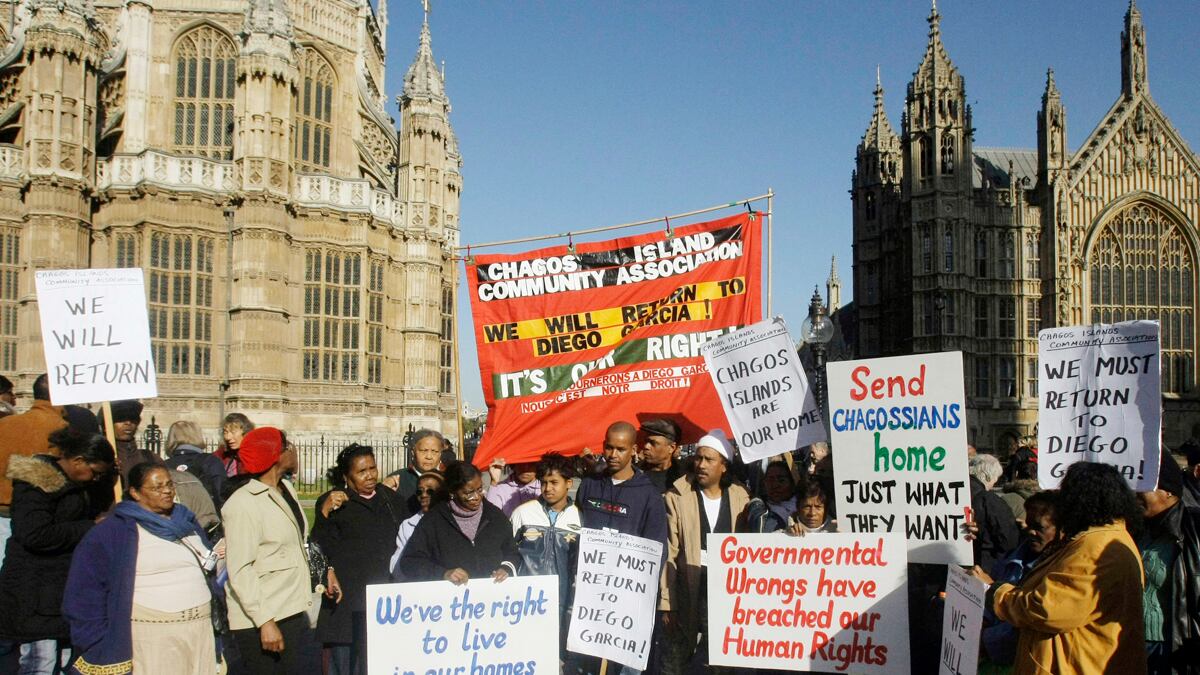President Obama missed out on the Queen’s Jubilee—his Kenyan blood would have made him welcome at her Commonwealth Club. He could have sat in on Friday’s meeting of highest importance to U.S. defense operations between the prime ministers of the United Kingdom and Mauritius. It concerned Diego Garcia, the Chagos island which the U.K. purports to lease to the U.S. for a naval air base, at least until 2016. The massive base boasts two of the longest runways in the world: they were used to launch “Shock and Awe” against Baghdad in 2003 and will be ready for a possible strike on Iran’s nuclear facilities. But one problem is that the U.S. has been a very bad tenant, using the base for international law crimes of torture and rendition. Another is that it has a native people, the Chagossians, who want to return home. And to cap it all, it may turn out that its U.K. landlord does not really own the land at all.
The rightful owner is Mauritius, of which the Chagos Islands were always part, ceded to the U.K. by France in the 1814 Treaty of Paris. When decolonization was ordered by the U.N. in the 60’s, it came with the international law requirement that the whole of a colonial territory should be granted independence. But the U.S. wanted the islands for a cold-war base and secretly offered the Wilson government a discount on the cost of Polaris missiles if it excised Chagos from Mauritius and got rid of the Chagossians. So Britain lied to the U.N., by pretending that there were no permanent inhabitants on the islands–the 2,000 Chagossians, settled there for almost 200 years, were described as “itinerant laborers.” Then, claiming ownership of the archipelago, Britain deported them to Mauritius and leased all the islands to the U.S. until 2016, permitting it to construct a massive naval base on Diego Garcia. So should this lease–for which the U.K. receives no rent–be renewed?
The first problem is that the U.K. may not own the Chagos Archipelago: an international court would be likely to find that it has unlawfully taken this property from Mauritius. Although Mauritius wants its claim adjudicated, the U.K. refuses to arbitrate and has excluded recourse to the International Court of Justice. Successive U.K. governments say they are confident that they have sovereignty, but they are afraid to have the question authoritatively decided.
Then there is the solemn promise made when Mauritius became independent, that Chagos would, in 50 years time, “revert” or “be returned” to Mauritius, if it was no longer required for U.K. defense needs. The U.K. now has no conceivable need to occupy any of the Chagos islands for its own defense, and Diego Garcia is only of strategic interest to the U.S.–although it is of vital interest were a decision to be taken to attack Iran’s nuclear facilities. The U.S. has spent several billion dollars building and upgrading the base, and cannot rely on its other facilities–in Iraq or Afghanistan--very much longer. There is a real possibility that the U.K. would refuse to allow what it might consider an unlawful attack on Iran to be launched from territory to which it claims ownership. In that event, the U.S. would have to fall back on the more subservient Australian government, which has recently provided it with a base on the Cocos Islands, which has no dispossessed people demanding to return.

The U.K., to its great embarrassment, has recently become embroiled in the problem that Diego Garcia has been used as a transit to torture. It is widely surmised that U.S. naval vessels berthed there have been one location for the waterboarding of terrorist suspects. In 2008 David Miliband, the U.K. foreign secretary, was forced to admit to Parliament (it had previously been denied) that the base had been used at least twice by the Americans for illegal rendition. Miliband was, even in this admission, economical with the truth: it is now clear from documents found in the Libyan Foreign Ministry that MI6 arranged for an anti-Gaddafi dissident to be “rendered” through Diego Garcia to torture in Tripoli in 2004. This means that the U.K. has not merely turned a blind eye to the unlawful use of the island by the U.S. In law, it is as guilty as any landlord who knowingly permits his premises to be used for criminal purposes by his tenant--all the more so when he joins in committing the crime. It would appear that MI6 actually requested American assistance for the Libyan torture trip.
The final episode of British perfidy came in April 2010, when without consultation with Mauritius (or with the Chagossians) the U.K. purported to establish a “marine protected area” for 200 miles around the Chagos Archipelago–an area of more than a half-million square miles. The real purpose of the zoning was revealed by a Wikileaks cable from the British to the U.S. State Department, cynically explaining that “establishing a marine park would, in effect, put paid to a resettlement of the former residents” because “ the environmental lobby is far more powerful than the Chagossian advocates.” The Americans were reluctant to buy this argument–they pointed out that “both the British public and policy makers would come to see the existence of a marine reserve as inherently inconsistent with the military use of Diego Garcia.” So it is, but it is clear from the cables that the U.S. wants to keep Diego Garcia for much longer than 2016–in fact, forever.
As if the U.K. had not done enough to disentitle itself, as a matter of morality, to hold on to Chagos, there is a judgment to be delivered later this month by the European Court of Human Rights, which may well require that permission be granted to permit the Chagossians to return. They succeeded in their claim for this relief in the High Court (two judges) and the Court of Appeal (three judges) but lost 2/3 in the U.K. Supreme Court. There is a reasonable prospect that they will win in the European Court of Human Rights, which will impose an obligation on Britain to facilitate their return to the islands. That obligation the U.K. cannot discharge while the U.S. refuses to permit the Chagossians to return to live in their own homes.
David Cameron’s government will be tempted to cut this Gordian knot by agreeing that sovereignty over the archipelago should henceforth repose in Mauritius, its rightful owner, and where most of the Chagossians still live. Mauritius is a modern democracy that has no truck with torture and although the U.S. would doubtless persuade it to grant a new lease for the naval base, there would be guarantees against it being used again for rendition, and a substantial rent that could fund the return of the Chagossians at least to other islands in the group. Otherwise, the U.S. should simply offer to purchase Diego Garcia from all its claimants--the U.K., Mauritius, and the Chagossians--for a price large enough to salve their collective consciences should it take the decision to use the island to bomb Qom.
Geoffrey Robertson QC’s extensive legal opinion on the Chagos question is published in Volume 36, No1 of the University of Western Australia Law Review (June 2012) and is available at geoffreyrobertson.com.





